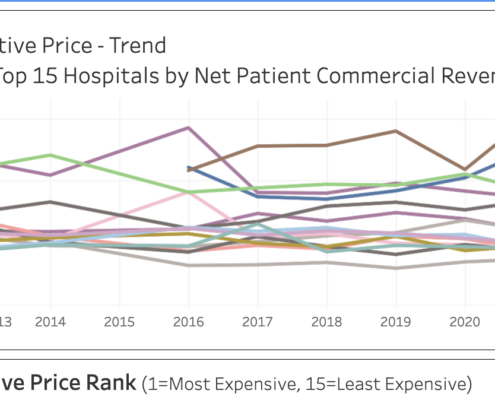
Boston Children’s, MGH Among Massachusetts Hospitals with Highest Relative Commercial Prices
Pioneer Institute's new tool, the Massachusetts Hospital Relative Price Tracker, displays relative price and facilitates relative price comparisons among hospitals. The average price among all hospitals will have a relative price of 1.0. A relative price of 1.5 means that a hospital charges 50 percent higher than the average of all Massachusetts hospitals. Similarly, a relative price of 0.84 means that a hospital’s prices are 16 percent below average. Relative price data is collected and reported by the Commonwealth’s Center for Health Information and Analysis (CHIA) and is an aggregate measure used to evaluate price variations among different hospitals. It is recalculated annually based on data collected from commercial payers and includes information on private commercial insurance and commercially managed public insurance products such as Medicare Advantage and Medicaid Managed Organizations/Accountable Care Partnership Plans.

Telehealth Progress Slowed in 2023
A new report by Cicero Institute, Pioneer Institute, and Reason Foundation reveals worrying stagnation in state-level telehealth expansion efforts in 2023, with only a few exceptions. Progress made during the pandemic is being lost even as provider shortages worsen, raising concerns about patients’ access to care.
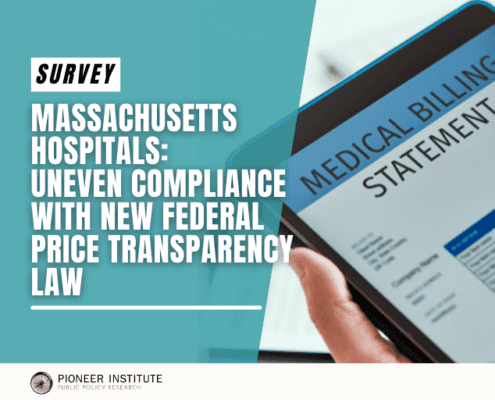
Massachusetts Hospitals: Uneven Compliance with New Federal Price Transparency Law
A 2019 federal law requires hospitals to make prices for 300 shoppable services available online in a “consumer-friendly format,” but a Pioneer Institute survey of 19 hospitals finds that information on discounted cash prices—the price most likely to be charged to consumers paying out of pocket—was unavailable at seven of those hospitals.
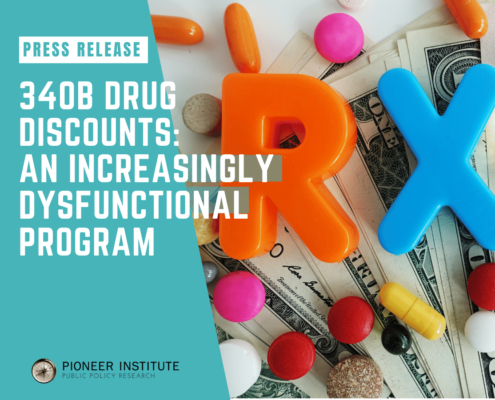
340B Drug Discounts: An Increasingly Dysfunctional Program
This report reviews the federal 340B drug discount program, showing that, over the past decade, the revenue for hospitals generated by the program, initially intended to serve low-income, uninsured populations, has exploded even while a number of important Massachusetts hospitals have reduced the level of charity care they provide. The study notes that nationwide, 340B drug sales rose from $9 billion in 2014 to $38 billion in 2020.

Testimony in opposition to S. 2651 to impose price controls
Testimony submitted on February 4, 2022 in opposition to S. 2651, legislation that would impose price controls on one of Massachusetts most important economic sectors, biopharmaceuticals.

Ten Health Policy Changes That Should Outlive COVID-19
A new study published by Pioneer Institute recommends ten healthcare reforms allowed during COVID-19 that should remain in effect permanently, after the state's emergency declaration for COVID-19 ends on June 15. These reforms have enhanced flexibility in the healthcare system, highlighting barriers that make the system more expensive, harder to access and less patient-centered.

A Brighter COVID Dashboard: State Should Cut Confusion And Clarify All Eldercare Cases and Deaths
Over time, the Massachusetts Executive Office of Health and Human…
Direct Health Care Agreements: A New Option for Patient-Centered Care That Costs Less and Reduces Provider Burnout
Especially in the COVID era, many are looking to alleviate the increased burden on the healthcare system. One solution is direct healthcare (DHC), which can provide more patient-centered care at affordable prices and is an effective model to increase access to care for the uninsured, underinsured and those on public programs like Medicaid. This paper aims to explain the possible benefits of DHCs, often using DPCs as an example, as they have built a successful record around the country and in Massachusetts.
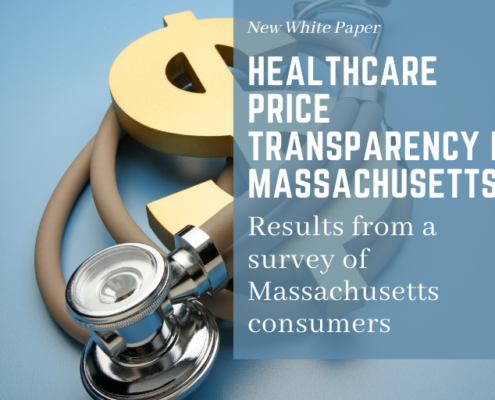
Healthcare Price Transparency in Massachusetts: Results from a survey of Massachusetts consumers regarding healthcare price transparency
In June 2019, Pioneer Institute, with support from Blue Cross Blue Shield of Massachusetts and the Massachusetts Association of Health Plans, contracted with noted pollster David Paleologos, head of DAPA Research at Suffolk University’s Research Bureau, to conduct a valid and reliable survey of Massachusetts consumers with employer sponsored health insurance. The goals of the survey were to determine consumers’ awareness, attitudes, views, usage, and knowledge of healthcare prices. This white paper presents analysis of the results.

The Massachusetts Crises Of Care Guidelines Need Re-Thinking
0 Comments
/
This new study contends that the Massachusetts Department of Public Health’s (DPH’s) Crises Standards of Care (CSC) issued earlier this month bear the earmarks of a state bureaucratic effort. The guidelines need to be rethought under a process that includes a thorough vetting by Massachusetts citizens.

Massachusetts Consumer Healthcare Price Transparency Survey
This public opinion survey, conducted by renowned pollster David Paleologos, Director of Suffolk University’s Research Bureau, focused on consumers’ view of healthcare price transparency. The poll showed that consumers want to know the price of care before obtaining it, and identified opportunities to improve consumers’ search for high-value, low-cost healthcare services.

Key Questions for Legislators on the Institute for Clinical and Economic Review (ICER)
As states continue to grapple with prescription drug costs, a new Pioneer Institute study lays out the key ethical, methodological and disease-specific questions policy makers should address before deciding whether to contract with the Institute for Clinical and Economic Review (ICER) to conduct cost effectiveness reviews used to make decisions about the purchase of medicines and other medical innovations.

MassHealth Protecting Medicaid Resources for the Most Vulnerable
This report finds that Massachusetts' enhanced eligibility verification has allowed MassHealth, the Commonwealth’s Medicaid program, to save significant resources that could be redirected to the care of truly needy Medicaid recipients.

Will New England See Lower Prices from Drug Pricing Transparency Legislation?
This report finds that most new drug pricing transparency laws do not lower consumer out-of-pocket costs, and that expensive and onerous compliance rules would likely put upward pressure on prices. The report reviews recent New England legislative attempts to reduce costs by requiring the disclosure of wholesale drug prices and other information about industry pricing practices.
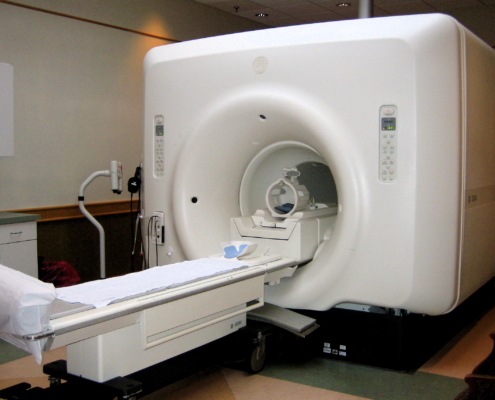
Need an MRI? In Worcester, Patients Pay Less for More
Data from the Massachusetts Center for Health Information and Analysis (CHIA) show wide variations in the prices agreed to between individual insurers and providers, the portion paid by insurers and the amount that is consumers’ responsibility to pay.

MA Health Insurers Have Improved Their Consumer Price Transparency Efforts, But Significant Work Remains
This study finds some significant improvements in the online cost estimator tools created by Massachusetts’ three largest health insurers, but there is much still to be done for the carriers to maximize the opportunity price transparency represents.

Recommendations of Pioneer Institute to the Special Senate Committee on Health Care Cost Containment and Reform
Jim Stergios, on behalf of the Pioneer Institute, provides public…

Testimony in Support of Expanded Access to Oral Health
There is a bill before the Massachusetts Legislature seeking to expand access to dental care through the creation of a mid-level provider position, commonly known as a dental therapist.

Dialing up Telemedicine
Massachusetts should more aggressively embrace telemedicine, which can reduce healthcare costs, increase patient satisfaction, and is more convenient for both patients and physicians.

What Massachusetts Should Do in an Uncertain Healthcare World
Regardless of what happens in the debate over repealing and replacing the ACA in D.C., Massachusetts has to tackle health care costs intelligently. We need to do more than provide insurance; we need to increase access to care. That means thinking seriously about the role of private market insurers, insurance regulations and the regulation of medical providers.

Lowering the Healthcare Cost Growth Benchmark
This policy brief applauds the decision by the Commonwealth of Massachusetts's Health Policy Commission to allow the benchmark for increases in the overall rate of healthcare spending to decrease this year, but urges state policy makers to remain focused on the larger culture changes that will be needed to rein in healthcare costs.

Counter Point What Massachusetts Should Do As Uncertainty Engulfs US Healthcare System
Regardless of what takes place at a national level, Massachusetts has its own set of challenges to continue pursuing the state’s commitment to universal coverage at affordable prices. This report offers a ten-point program that the state should vigorously focus on in the days ahead.

Massachusetts Hospitals Score Poorly on Price Transparency…Again
Eighteen months after an initial survey of prices at hospitals in Massachusetts, Pioneer Institute conducted a follow-up survey of all but one of the hospitals from the first survey to see if there had been any change in the performance of these institutions since their last assessment. Initial survey calls were conducted between September 20th and November 2nd, 2016.

Recommendations to the Transparency Subcommittee of the Special Commission on Provider Variation
Submitted to the Special Commission on Provider Price Variation on January 31, 2017

Testimony on Healthcare Price Transparency
Testimony emphasized the need to focus more on what would help consumers make better decisions about spending on healthcare.

Transparency in Retail Drug Prices: Easy to Obtain but Accuracy May Be Doubtful
This paper is the fourth in a series on price transparency in the healthcare industry, and the first Pioneer report to focus on the retail price of prescription medications. Researchers called 44 retail drug stores across the state asking for the price of a 30-day supply of each drug in a common dosage. In each case the callers said they were self-pay and pressed the drug store for information about discounts.

Over A Decade, The ACA Fee On MassHealth Will Cost Hundreds Of Millions Of Dollars
In “Over a Decade, the ACA Fee on MassHealth Will Cost Hundreds of Millions of Dollars,” authors Lauren Corvese and Josh Archambault examine the potential budget impact of the Health Insurer Provider Fee (HIPF), a revenue-raising mechanism for the Patient Protection and Affordable Care Act (ACA).

Combating Opioid Addiction in Massachusetts: A Hospital-Based Solution Shows Promise in Reducing Relapses and ER Costs
Preliminary results suggest that a new program that gives opioid overdose patients at Beth Israel Deaconess Hospital-Plymouth (BID-Plymouth) multiple opportunities to access detox programs, psychological counseling, anti-abuse drugs and other services is proving effective at reducing recidivism and returning opioid users to more productive lives.

Are Drug Prices Driving Healthcare Cost Growth?
This report illustrates that state policy and legislative recommendations requiring pharmaceutical companies to disclose proprietary information would discourage the development of new innovative medicines, lead to higher healthcare costs over the long term, and potentially damage a big driver of Massachusetts' business economy.

Bay State Specialists and Dentists Get Mixed Reviews on Price Transparency
Pioneer surveyed 96 specialists from across Massachusetts, split…
